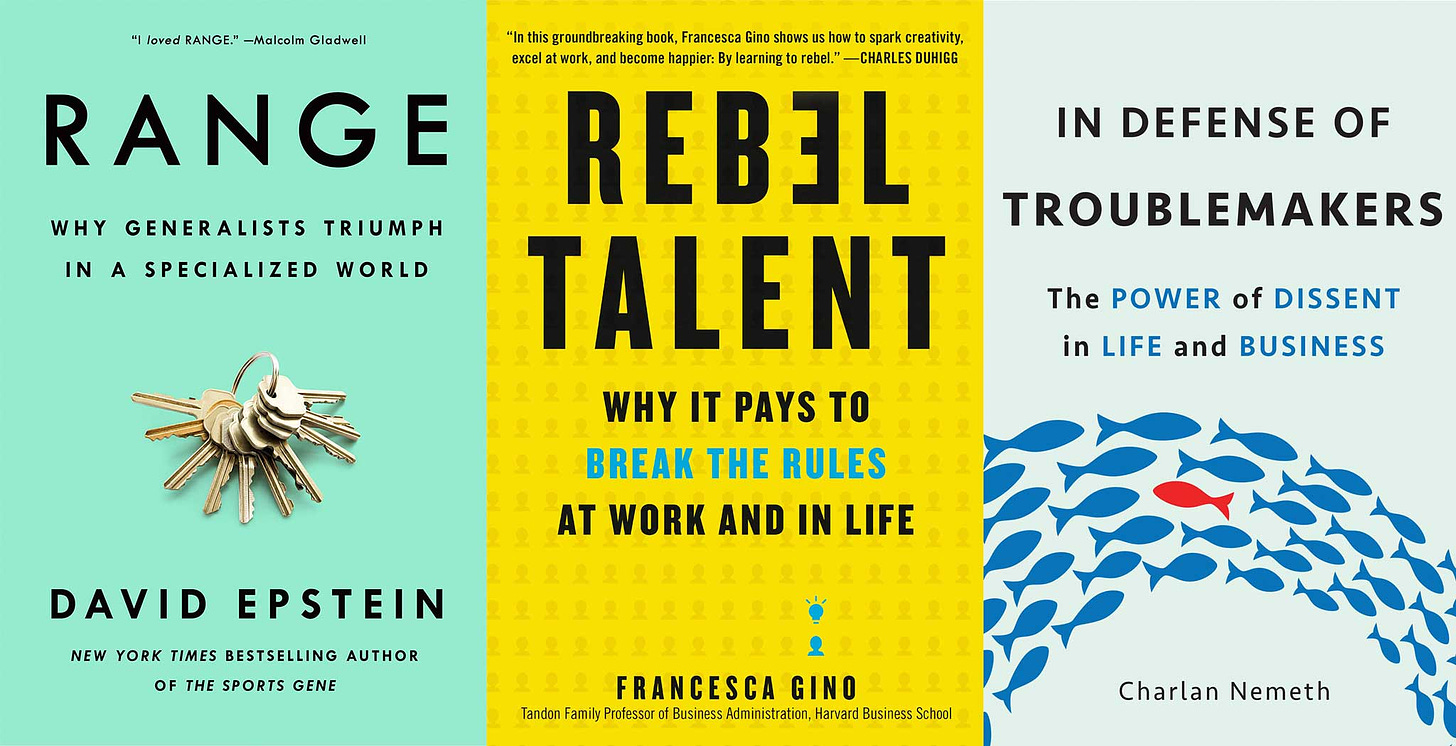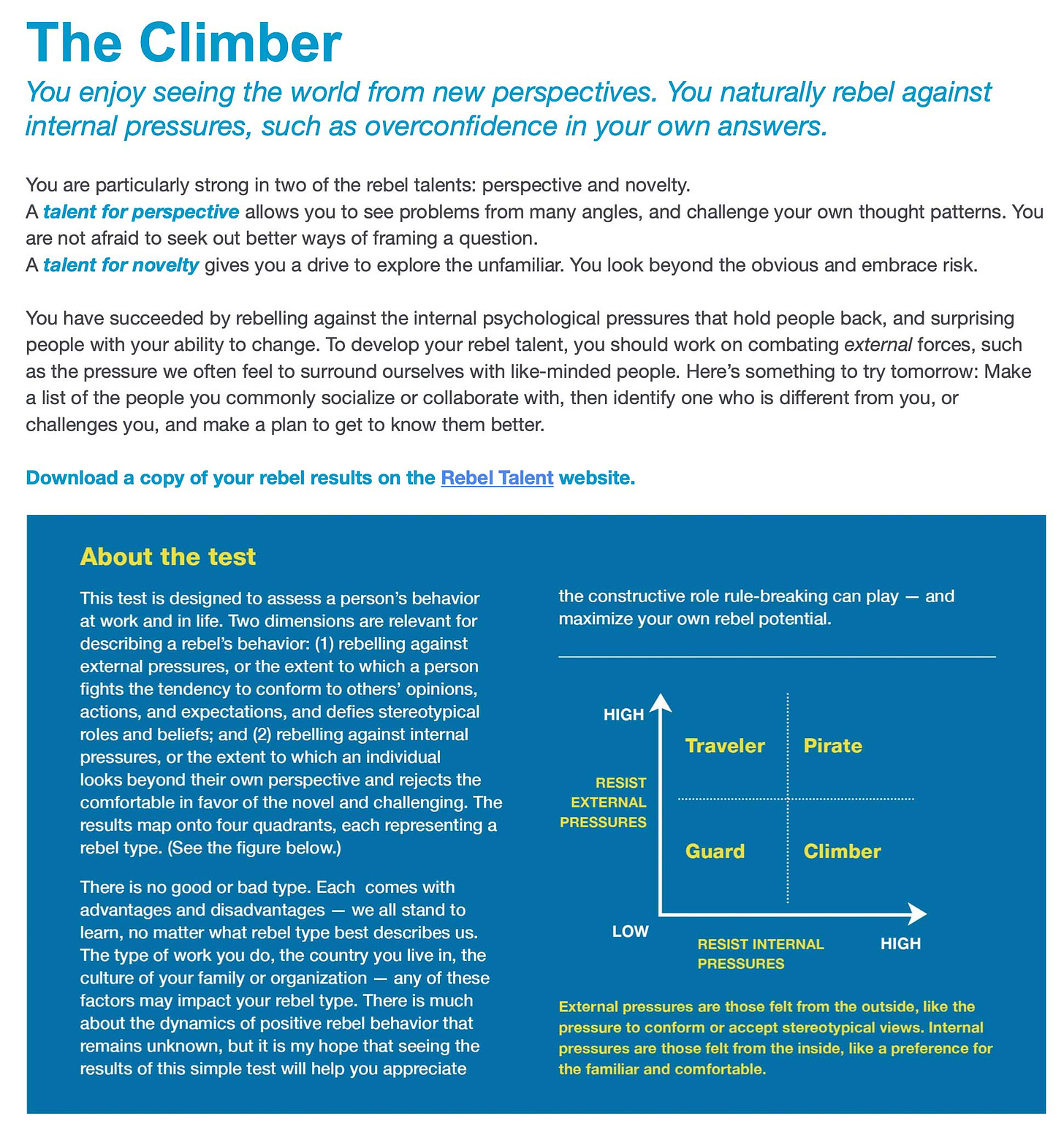
När man skriver “troublemaker” i sin LinkedIn-profil så får man en del frågor.
Min uppfattning har länge varit att grupper och organisationer mår bättre av olika ståndunkter, och att mångfald inte bara handlar om ålder och kön, utan om värdet av olika referenser, bakgrund och erfarenheter för att fatta bättre beslut och hitta nya lösningar på svåra utmaningar.. Även om det är lite mer obekvämt.
Här är tre nya böcker som stödjer denna tes.
Range
Specialisering är ju på modet. 10.000 timmars fokus för att bli bäst bäst på någonting. Och det är vettigt i en miljö med tydliga ramar och spelregler. Som schack eller golf. Men i en dynamisk värld där reglerna hela tiden ändras, så har specialisterna inte alls samma fördel. Då kan det vara bättre att vara generalist och applicera kunksap man skaffat sig inom heltr andra områden. I vissa fall är specialister rejält dåliga på att innovera inom sitt eget område.
Plenty of experts argue that anyone who wants to develop a skill, play an instrument, or lead their field should start early, focus intensely, and rack up as many hours of deliberate practice as possible. If you dabble or delay, you’ll never catch up to the people who got a head start. But a closer look at research on the world’s top performers, from professional athletes to Nobel laureates, shows that early specialization is the exception, not the rule.
David Epstein examined the world’s most successful athletes, artists, musicians, inventors, forecasters and scientists. He discovered that in most fields—especially those that are complex and unpredictable—generalists, not specialists, are primed to excel. Generalists often find their path late, and they juggle many interests rather than focusing on one. They’re also more creative, more agile, and able to make connections their more specialized peers can’t see.
Provocative, rigorous, and engrossing, Range makes a compelling case for actively cultivating inefficiency. Failing a test is the best way to learn. Frequent quitters end up with the most fulfilling careers. The most impactful inventors cross domains rather than deepening their knowledge in a single area. As experts silo themselves further while computers master more of the skills once reserved for highly focused humans, people who think broadly and embrace diverse experiences and perspectives will increasingly thrive.
In Defense of Troublemakers
Charlan Nemeth har forskat på hur meningsskiljaktighet leder till bättre beslut. Framförallt jurygrupper, där en enstaka person som tycker annorlunda, leder till mycket bättre domar. Och i business. Men det är viktigt att det är äkta, och det räcker inte att leka “djävulens advokat”.
Här är en bra intervju
Och Tomas Tunguz sammanfattar:
When we are exposed to dissent, our thinking does not narrow as it does when we are exposed to consensus. In fact, dissent broadens our thinking.
This is because dissenters often share a critical perspective or data point that the majority didn’t know or hasn’t considered. That “one piece of unique information could change the whole picture and the final decision”
Importantly, dissenting opinions don’t have to be correct to improve the decision. Dissent breaks the blind following of the consensus and dissent stimulates thought that is more divergent. By exploring a problem space more broadly, a group makes a better decision.
But dissent in a room must be genuine. Tools like playing Devil’s Advocate work only if the person playing Satan’s lawyer genuinely believes in the dissenting view or genuinely wants to explore the other argument.
Creating a culture that actively encourages dissent is one of the hardest managerial challenges. Teammates must trust each other to be able to argue a minority position, and to feel confident enough to explore new angles, share new data points, and take the time to debate an issue, rather than simply agreeing with the majority.
Rebel Talent
Francesca Gino visar hur många av värdens mest framgångsrika personer medvetet bryter reglerna för att bygga företag eller skapa förändring. Och varför de ibland kan vara svåra att ha i “vanliga” organisationer.
We think of them as troublemakers, outcasts, contrarians: those colleagues, friends, and family members who complicate seemingly straightforward decisions, create chaos, and disagree when everyone else is in agreement. But in truth, rebels are also those among us who change the world for the better with their unconventional outlooks. Instead of clinging to what is safe and familiar, and falling back on routines and tradition, rebels defy the status quo. They are masters of innovation and reinvention, and they have a lot to teach us.
När jag testade mig så blev jag:



